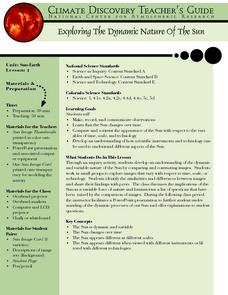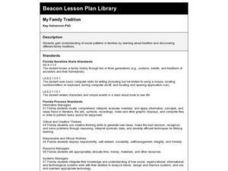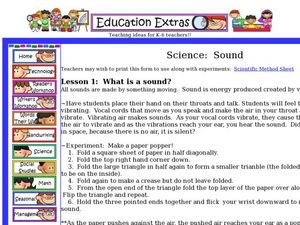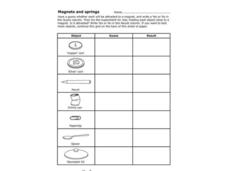Curated OER
Using Amino Acid Sequences to Show Evolutionary Relationships
Junior biologists compare the amino acid sequences from fragments of five different globin molecules. They count the letter differences between each species pair. They construct a graphic representation of the evolutionary relationships...
Curated OER
Genetics and Genetic Engineering
Pretty purple slides present a plethora of jargon related to genetic engineering. Most of them have one term across the top and a brief explanation of that term below. They are arranged in alphabetical order, which may not be the most...
Curated OER
The Human Body: Bones
Here is an interactive PowerPoint about the skeletal system. The first slide shows the entire skeleton and allows learners to try to name each major bone structure before clicking to show the answer. The following slides provide more...
Curated OER
Night of the Twister
Students use reading strategies for Night of the Twister. In this reading strategies lesson, students name five major catastrophes and books about each. Students complete a vocabulary section, make inferences and predictions, read the...
Curated OER
Effects of Acid Rain
Third graders explore the concept of acid rain and its effects on ecosystems. They are placed in groups and using a graphic organizer they brainstorm their ideas about what would happen to the ecosystems living within these environments...
Curated OER
Animals at the Zoo
Students identify a variety of animals that can be found at the zoo and select one to conduct research on. In pairs they conduct Internet research, complete a graphic organizer chart, and create a two slide PowerPoint presentation.
Curated OER
Interdependence and Adaptation
In this animal adaptation worksheet, students look at pictures of 6 animals below a graphic organizer. They place the animal in the organizer based on the description of its adaptation.
Curated OER
Exploring the Dynamic Nature of the Sun
Students compare and contrast images of the sun taken at different times and viewed at different scales. They record their observations in a journal and create a graphic organizer to help analyze their observations.
Curated OER
My Family Tradition
Students examine different family traditions to further explain social patterns. They complete a graphic organizer using educational software.
Curated OER
Dew Point Temp Worksheet
In this temperature learning exercise, students complete 3 graphic organizer by determining the dew point temperature based on the dry-bulb and wet-bulb thermometer readings.
Curated OER
Exploring Magnetism in Solar Flares
Students apply concepts of magnetism to help them understand the production of solar flares. In this solar flare lesson, students complete activities and graphic organizers to help them learn about magnetic fields on the surface of the...
Curated OER
Temperature in The Atmosphere
In this science worksheet, students find the answers to the five questions and they fill in the graphic organizer for the temperatures found in different heights of the atmosphere.
Curated OER
Formulas and Mole Conversions
In this formulas and mole conversion worksheet, students answer 22 graphic organizer, multiple choice, and short answer questions pertaining to formulas and mole conversion.
Curated OER
Characteristics of Materials
In this science graphic organizer worksheet, students find 6 objects around their home and describe the materials they are made of. They tell what the object is made of, what it is used for, and if the material is a good choice, and why...
Curated OER
Compare and Contrast Type 1 and Type 2 Diabetes
Learners use graphic organizers to compare and contrast Type 1 and Type 2 diabetes. In this diabetes lesson, students are given information on the two major types of diabetes. They analyze how to compare and contrast the information.
Curated OER
What is a Sound?
Second graders explore the concept of sound. For this sound lesson, 2nd graders discover what sound, vibrations, and pitch are through several experiments. Students watch a Power Point presentation that allows them to complete a graphic...
Curated OER
Light Is Amazing
Students investigate light and its energy. They discuss the properties of light, research how much light the moon absorbed on their birthday on a website, complete a graphic organizer, and create a kaleidoscope.
Curated OER
Finding Epicenters
In this earthquake instructional activity, students determine the distance of different cities to the epicenter of an earthquake based on the "P" and "S" wave arrivals on the seismographs. This instructional activity has 1 graphic...
Curated OER
Friction
In this friction worksheet, students examine objects around them by writing details in the graphic organizer. Headings include high friction, low friction, useful, and not useful. Pictures are provided to prompt students.
Curated OER
Magnets and Springs
In this magnetism worksheet, students complete a graphic organizer by predicting which of the 7 pictured objects will be attracted to a magnet and which ones will not. They write their own experiment about whether an object will or will...
American Chemical Society
Change in Temperature - Endothermic Reaction
Now that learners have been exposed to chemical changes, they learn that some take in heat and therefore, decrease in temperature. The same reaction that they have been investigating between baking soda and vinegar is revisited,...
Curated OER
How Do Living Things Form Communities?
In this communities worksheet, students will write down 1 main idea about communities formed by living things. Then students will brainstorm 3 details to support their main idea. This worksheet is a graphic organizer.
Curated OER
Let Me Tell You About My Favorite Animal
Students create books about their favorite animals using graphic organizers.
Curated OER
Communication Comparisons
Students investigate various methods of communication. In small groups, they conduct Internet research, compare/contrast three methods of communication, and complete a graphic organizer.

























